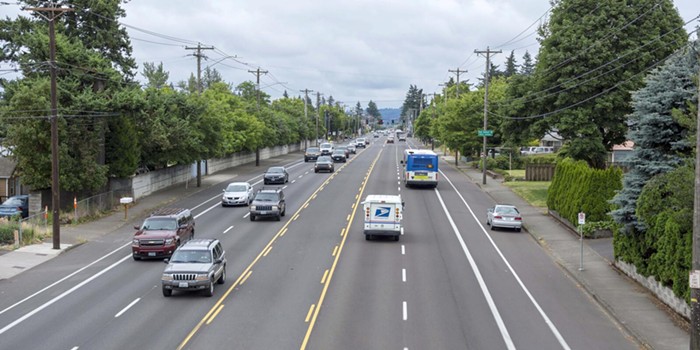On Wednesday morning, October 11, ezeji muYesu—a 60-year old portrait photographer and writer who moved to Portland last fall—stood on the corner of NW Broadway and Glisan behind the Federal Building, waiting for the #9 bus.
He saw a police officer round the corner in pursuit of a man on a bicycle. The officer Tasered the suspect in the back. MuYesu was shocked to see the officer walk over to the man lying on the pavement, lift his leg high and kick him—apparently in the ribs—with "a violent forcefulness that was horrifying," muYesu says.
The police arrest report tells a different, gentler story. According to the report, the Taser probes did not penetrate the 29-year-old suspect's skin because he was wearing a heavy leather jacket. The officer wrote that the suspect was "on his knees" after he was Tasered, and that the Taser "did not appear to have any effect." He told the suspect to get down on the ground and says, "the suspect did not comply and I pushed him over with my foot."
But another citizen—she'd prefer to remain anonymous—concurs with muYesu's account. "I was heading south on Broadway in my car, and pulled over because I was so shocked by what I saw," she says. "I didn't see the suspect on his knees. He was all the way down, lying sideways on the sidewalk, and the officer just kicked him, boom, in his side."
MuYesu—who declined to name the cop involved—asked the officer why he had kicked the man in such a way. He says the officer told him, "I'm looking for drugs, have you seen any drugs?" In contrast to what the officer allegedly told muYesu at the scene, the arrest report makes no mention of the suspect's alleged drug use. Initial contact was made with the man for riding his bike on the sidewalk, the report says, and he was arrested for "interfering with a police officer," and "disorderly conduct" after riding away when the officer and his partner—who remained in the patrol car—asked him to stop.
"No, I haven't seen any drugs," muYesu replied. "But I did see you kick that young man." He says the officer replied, "with much condescension, 'I'll slam you to the ground.'"
MuYesu says he was really scared until the officer's supervisors, Lieutenant Todd Wyatt and Sergeant Jeff Miller, appeared on the scene.
"Sergeant Miller began to try to explain the officer's behavior with some difficult-to-understand talk about the incident... and that I did not understand what I had seen," wrote muYesu, in a subsequent letter to Wyatt dated October 15. "He was right; I don't understand abusive behavior."
On October 24, Lieutenant Wyatt responded to muYesu's letter, saying he appreciated that he had taken the time to write, and that his complaint had been forwarded to the city's Independent Police Review (IPR) division for review. The second witness to the incident has reportedly confirmed muYesu's version of events with the IPR.
On November 9, almost a month after the incident, IPR Director Leslie Stevens wrote to muYesu saying she has referred his complaint to the police bureau's internal affairs division for further review.
In the meantime, the officer—Officer Jason Lobaugh, according to records—is still working patrol.
"The complaint is where it should be," says police spokesperson Sergeant Brian Schmautz, who cannot comment on specific, ongoing investigations. "The officer will be called in to explain him or herself, the internal affairs people will take statements from the witnesses and ultimately decide whether the complaint is upheld."
As for muYesu, he says he "expects little" out of the complaint process.
While the IPR has the power to investigate allegations of excessive force independently, it has never done so, preferring to let the cops investigate themselves as it has done in this case, according to Northwest Constitutional Rights Center Executive Director Alejandro Queral.
"Unfortunately, any time a resident complains of police misconduct, the investigation is sent to internal affairs. This raises the specter that the investigation may be biased in favor of the police officer because you have police investigating the police," he says.
MuYesu says he wants his complaint to be public, so the city will pay attention to it. "This way, the mayor and the police chief can't say they didn't hear about my complaint, or pass it off to one of their secretaries," he says. He's also hoping for a little insurance: He's afraid of retribution from the cops. "I'm a 60-year-old man, but I'm still scared of the police."


















